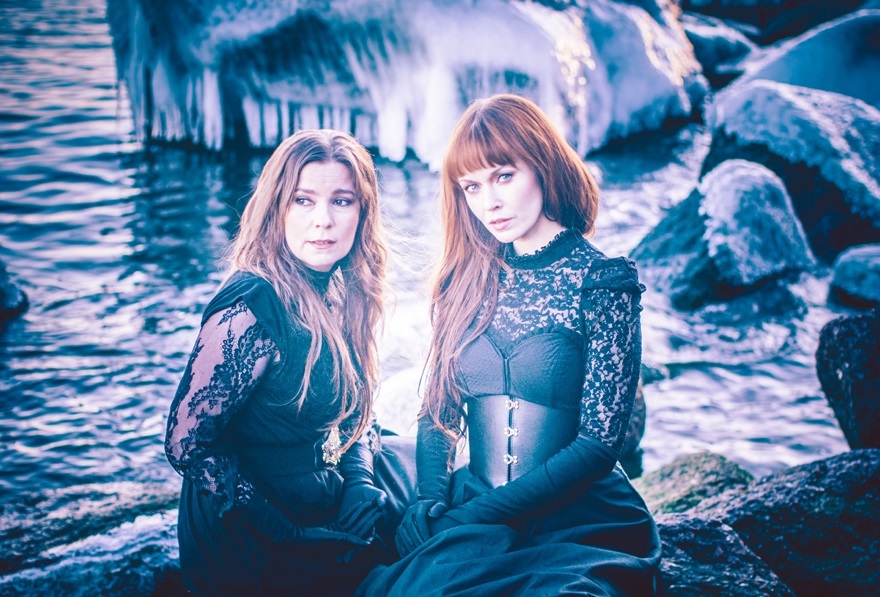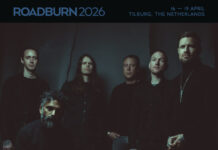If you’ve known me for at least 5 minutes, two things become very apparent: one is that I love my place in this world as a fan of things, and two, I love and adore music above all else. Now, I’m willing to bet that most people reading this are enthusiastic fans of music as well and I don’t think myself as being unique for my attachment to singers and songwriters. However, I pride myself on being on the unofficial street teams for the musicians that I love. Spotify links are my love language and if I make you a playlist it’s my version of a marriage proposal. So, when I was presented the opportunity to write a long-form ramble about my love for the self-titled ALTAMULLAN ROAD album (nearly 3 years after it came out), I jumped at the opportunity.

You see, there’s just something magical about women tag-teaming an album and girlbossing their way through the entire spectrum of emotions with such palpable enthusiasm, that it draws me in. It’s so very apparent that both Johannas adore each other and are each other’s biggest fans in a sense. In fact, there’s an interview here where they talk about just that. Music shared between genuine friends has a certain way of making the listener feel like a friend as well.
So, since I’m very calm and collected about how much I love this record, I figured I would take you all on a literary journey of my internal monologue when I listen to this album. Now, I am a millennial with a ginormous iced coffee in my hand at all times and a knack for changing songs after 30 seconds, so, when I say that this is one of the only pieces of music I’ve ever heard that I can listen to from beginning to end with no skipping and no shuffle, you know my love for it is real. I’ve noticed that Johanna Kurkela seems to write more long-form stories or prose, while Johanna Iivanainen likes to depict things that touch on all five senses. Their unique and distinct writing styles are what makes this album such a treat. They both bring such a personality and sense of purpose, that you, as a listener, just get to sit back and process all the emotions under the sun.

The album starts off with “When It’s Time,” a seemingly romantic song upon first listen. The first 20 seconds or so are just haunting drums and strings that sound like a lover’s forlorn wail. Sweet and succinct, you are immediately given a balm from the haunting introduction with the most intricate and intimate rumination of a wedding day long past. Johanna Iivanainen’s soulful tones coupled with Johanna Kurkela’s sweet, aspricious timbre begin to tell a bone-chilling story of grief and longing.
When I say it sounds “seemingly romantic” upon first impression, I mean that it sounds like a romantic song that speaks of the unstoppable love between two people. However, when you dig deep into the lyrics, “My love, our day has come / Would you still walk with me?” and “Now with brittle bones and heavy eyes,” you realize that this particular song is highlighting what anyone in a long-term relationship fears: how to live in a world without your loved one.
As someone who married young and has been with my spouse for nearly half of my life, I worry about these things constantly. Do I have an identity outside of my marriage? What would I do if half of me was no longer on this mortal plane? Would loneliness eat at me from the inside or would I find a sense of peace within it?
The sentiment of growing older together and aging with one another is beautiful and devastatingly honest. So many relationships fail to last and those that do last are precious and should be treated as such. The idea of someone looking back on their life and acknowledging the shared responsibility of growing with each other with “You built the house / I grew our meal” is a topic that not many songwriters have acknowledged. Relationships take teamwork. But what happens when that team is no longer? Imagine having to bury a loved one and suddenly the team is a single person. The thought alone makes my heart ache and my lip tremble. Especially in a world that slowly emerging from a pandemic, this rings true even more than before.
The imagery of brittle bones and heavy eyes is particularly engaging. Two very real things that happen as we age. Our bodies weaken, but our hearts stay strong. There is a reason this has been number one on my Spotify “on repeat” for almost 2 years straight. If you have a favorite fictional pairing, this works well to add some nice angst to any transformative works you may have. Also, it’s the perfect song to play when you want to beat your hands against the steering wheel or need to put your heart through a pasta press.
After you’ve wiped your eyes and longed for a love you might not even have, you are immediately given the soothing calmness that is “Hearts of Old” – an ode to those we love in a different sense. Though, I suppose it could be interpreted as romantic by some, it strikes me as a song you sing to a friend or pet as you tear up thinking about how much you adore them. I sing this to my cats as I brush them and they’re nice enough to not remark on my terrible singing voice.
The song starts out with some lovely icy imagery. It’s a beautiful juxtaposition, comparing your companion’s resilience and strength to your personal frailty and sensitivity. Because what are friends – furry or human – but safe places for us to crumble and be rebuilt? I cannot tell you how many times I’ve cried into my cat’s belly or laid my head in a dear friend’s lap.
When I close my eyes and listen to this song, I think of taking a nice, long walk along a wintry path with someone or something dear, and simply enjoying each other’s company. There is a live performance of this song online and it’s, without a doubt, my favorite live performance from any band or artist ever. There is such joy on their faces as they sing together – likely stemming from the unfortunate cancelation of their planned tour together. It’s bittersweet that there is only that performance to see because it definitely shows you how enchanting their voices meld together live and is a great example of what the song itself represents: friendship.
Now that you’re safe and warm with the feeling of friendship, “Song of the Lark” swoops in and brings you a gentle tune about the duality of existence. This is what I meant when I said that Johanna Iivanainen is so very good about telling you exactly what to see and hear. Larks sing as a gentle welcome to the day and act like a less-intrusive alarm clock than whatever your phone is capable of. I live in the United States right along the Mississippi River in the Midwest, and our area is a wonderful mix of metro and farmland. You have acres of grassy knolls and just a few minutes later a farmer’s market with all sorts of goodies.
“Lost between two worlds” makes me think of the longing of living a simple life barely on the grid, but still relying on technology for many things. Raising animals on a farm, but taking cute photos of them and putting them on Instagram? Wonderful, if you can juggle those two very different worlds. In some way, it reminds me of the film, The Village, where two very separate worlds exist within each other without ever realizing the other is there. Imagine a world where, instead of podcasts and audiobooks, we listened to the soundscape of nature and the Earth itself. Neither is better than the other – look at how many YouTube channels have hours of just birds chirping!
I really enjoy the imagery of cutting corn and oceans and stars. It makes me feel so very small in a big, overwhelming world. It’s familiar in a sense, considering I live just a bit from farmland. But, I personally enjoy the sounds of the city. A balance of both is truly fascinating though.
Now that you’re contemplating your existence on this mote of dust suspended in a sunbeam, “Underwater” barrels into you like a boot to the chest. I’m already a sucker for aquatic imagery, but I’m an even bigger sucker for songs about sadness and anxiety. I always liken my feelings of sorrow to being supine with a heavy bag of water pressing against my lungs. So much of this song reads as begging the universe to just let up a little bit. We’ve all been there when life just seems to knock you down and you cannot seem to catch your footing – almost as if the tide is sweeping you off of your feet and tangling around your ankles.
The lyrics for this song are interesting in that they’re clipped and short phrases, similar to when someone asks if you’re fine and you’re clearly not, but explaining anything is daunting and just not worth it. If “I’m fine” was a song, it would be this one.
The themes of darkness and isolation obviously make me think of the pandemic but also are so applicable to many things in life. Loneliness can be so suffocating, especially when spiraling alone with your thoughts. This song seems almost like the direct opposite of “Hearts Of Old.” In my mind, when this song plays, I picture someone sitting alone in a room completely shrouded in shadow with only a beam of moonlight and a puddle of rainwater to keep them company. Misery loves company but isolation fosters misery best of all. Sadness festers with no light and the water only gets darker the deeper you go.
As time passes by, we are now facing “Art of Losing,” which marks the halfway point of the album. The first thing that always gets me about this song is the picture that’s painted. I personally see someone sitting on a bench, looking over at someone emotionally distant and looking away with dejection and holding back tears. The cherry blossom mention is particularly vivid and the idea of watching petals blow and dance in the wind to avoid looking at someone that’s moving further and further away is something I think most people can resonate with. We’ve all encountered loss in our lives, be it in the form of a partner, friend, or enemy. So to describe such a powerful scene, invokes a feeling of melancholy that unites us all. From the previous track to this one, it’s clear that as humans we yearn for connection and begin to flounder when that is taken away from us.
“Interstellar Friends” is a nice distraction from the feeling of loss. A song that makes us really sit and think about how miniscule we are in the grand scheme of things, is always a good way to put things in perspective. We are our own main characters, but what are we to everyone else? I personally aim to be the NPC in Skyrim that is dead but still somehow still finds a tankard and a loaf of bread. However, that’s just a “me” thing. I think if I were to befriend any of the planets it would be Neptune. She’s watery, distant, and minding her own business. Life goals, in my opinion. I know this song is inspired by the film Interstellar, which has one of the best scores I’ve ever heard. There’s just something so soothing about realizing how small we are.
The song itself is a beautiful lullaby of sorts. The quiet chanting of “off we go” while the interwoven lyrics tell us where we’re going in the song is a wonderful bout of teamwork. It almost feels like the listener is stuck in a narrative tug-of-war. Are we going somewhere or are we staying and floating amongst the stars? Can we do both? In the end: space is so cool and we really are pretty insignificant, silly human beings just trying to do our best on this cool planet.
“Candle in the Dark” is a song that went woefully underappreciated by me for an embarrassing long time. It wasn’t until I sat down on my floor during a massive thunderstorm earlier this year, that I truly read the lyrics on the sleeve of my vinyl and processed them in my own way.
“I’ve sought for solace in many places” is something incredibly poignant. Not only does it roll off the tongue in a very satisfying way, but it also touches upon our primal need to find safety and security in things. Now, I’m not here to discuss theology or judge anyone’s coping mechanism, but the list of things like books, religion, and people, are what I perceive as incredibly common sources of safety for people.
“Yet my hands stayed empty” just reiterates that our own happiness and tranquility is our own journey to amble. I’m not exactly sure what a “dead man’s hand” could mean, but I’m willing to wager it’s a secret only Johanna Kurkela knows and we are simply supposed to accept it and appreciate it at face value. “Turn death into diamonds” is one of the most noticeable pieces of text in the song, in my opinion. We all view death as something dark and damask, akin to charcoal. However, we forget that with death comes rebirth and that, in fact, could lead to the most beautiful of opportunities. Hence, the diamonds.
On a lighter note, this song is one of two featured on their Instagram as a small teaser for their live performances. There’s a certain something about the angle of the video and the coziness of it, that just reminds me of being small and gathering around my father with my sisters as he sang us John Denver and played the guitar. And while this song is about searching for a sense of security and how love can be our only lifeline at times, that small snippet of a very intimate setting and unfiltered voices puts me at ease immediately. I personally think they should just broadcast an acoustic set from their rocking chairs and I would hand over any amount of money to sit and feel as if I’m part of this little sisterhood of music and deep emotional bonds, if only for an hour or so. Perhaps that is my own personal candle in the dark.
“The Merry Scallywag” is a collaborative effort between the two of the Johannas. It’s similar to doing a puzzle with someone and realizing that both of the pieces that you’re holding are the exact ones you need to finish the border. It ebbs and flows like calming waves of the sea until the sweet, intoxicating lull of their combined siren’s call draws you in and lures you towards a jolt in the scene where it picks up in intensity. I can picture them both sitting on stools with their respective instruments, swaying and smiling as they somehow encapsulate the feeling of being at sea while the audience is sitting stationary in chairs. It’s minimalist in the lyric department but speaks volumes with the shanty vibe and insistent beat of the tune. By the end of it, I’m willing to lay my life on the line and follow these two into any depths without a single regret.
And then we come to “They Should’ve Sent a Poet.” I have many feelings about this particular piece of music but I’ll try to keep it succinct. When I first heard this song, I actually didn’t like it at all. I was your standard it doesn’t fit the rest of the album butthead and while I think I’ve atoned for that awful attitude, I still feel guilty over my knee-jerk reaction!
Inspired by Contact (1997), a film about a young girl with aspirations that know no bounds, the song is a pep talk to all those who are doubted. In the film, Jodie Foster’s character is gaslit and made to feel as if her lifelong dreams were foolhardy and worthless – a feeling I know most of us are quite familiar with. In the same interview mentioned above, Johanna Kurkela speaks about Neil Gaiman’s commencement speech and what nuggets of advice stuck with her (side note: I also sent that interview to Neil himself and he thanked me for showing him because what’s better about being a fan than helping other fans get the attention they deserve?) She talks briefly about being hesitant and tentative about songwriting, which struck a chord with me because, while I chose digital art instead of songwriting, I very much feel that way about my own sense of expression.
The song immediately launches you into space and lets you drift amongst the synth-pop vibe for a moment. Then you’re gifted with some nicely-wrapped spiritual wisdom about making your own dreams and carving your own path in this world. “No one can dream for you” is so incredibly true alongside “Become what laughter is to you”… I wanted to come up with a sense of imagery about what laughter is to me, but it changes all the time!
“Dreams are dangerous” and “abnormality breeds calamity” are two of my favorite things ever written. No, that’s not hyperbole, I’m quite serious. I am so serious that I got the phrases tattooed over my thumbs so that when I’m feeling lesser than or insecure about my own craft, I see that I’m the only one holding myself back and that I should be much kinder to myself.
And that initial dislike of the song for not “matching” the album? I love it now. I really do. I always grin like a big ol’ idiot when this plays and I’ve gotten people on all seven continents talking about it. When I said I take my unofficial street team membership seriously, I wasn’t joking! If you ever need a little boost of confidence, I recommend listening to this as loud as you can while you create whatever the heck you want. It truly helps. Then send it to someone else who could use a little love and have a small dance party over FaceTime. I assure you, it helps.
After the emotional rollercoaster that has been the album, you are presented with “Dawn,” a beautiful instrumental track written by Johanna Iivanainen. You know that scene in most thriller films, where the sun rises and the remaining characters rejoice that they made it through the night, as credits begin to scroll by? That’s exactly what vibe this brings. It’s quiet, soft, and cathartic. It’s also a nice representative of the delightful teamwork used to put the album together. The strings and the piano are gorgeous together and only further convince me that these two making music together was a divine intervention or something mystical. And while they are incredibly busy on their own separate adventures, I do hope that their trails come back and meet and we get to experience more of the pure and supportive friendship these two have.
Written by Kathy Criswell





